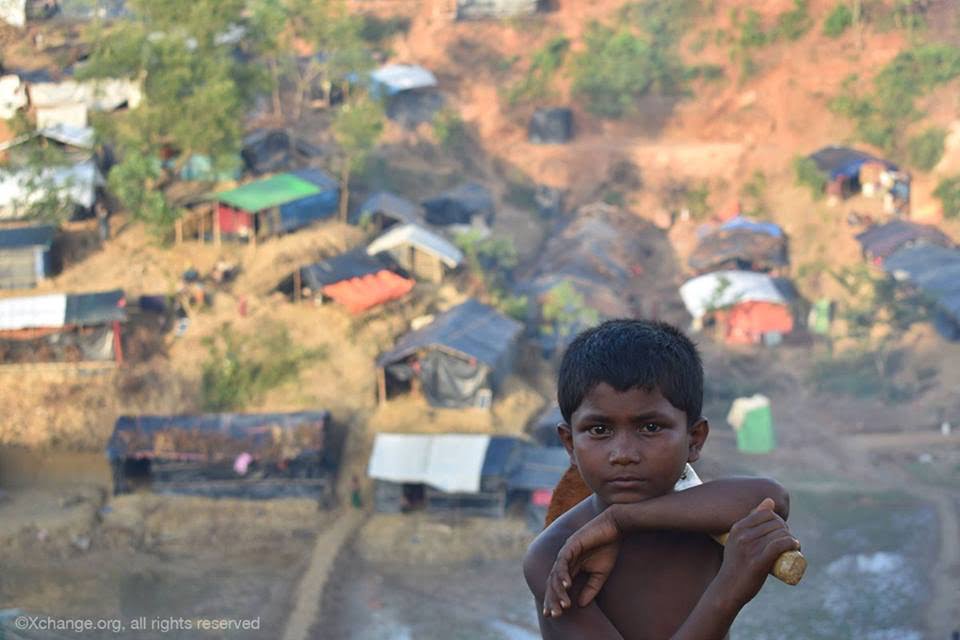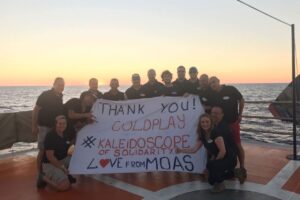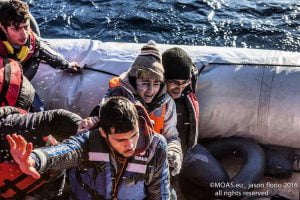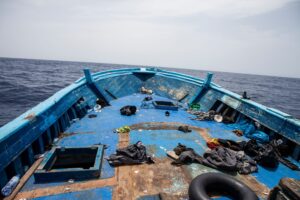Mohammed is three years old and belongs to the stateless Rohingya community, which is known to be the world’s most persecuted minority. The MOAS team met this young boy at our Aid Station in Shamlapur (Bangladesh), where thousands of Rohingya found refuge following the latest military crackdown in August 2017. In Shamlapur there are currently 13,000 people, and many of them come to the MOAS Aid Station to receive medical assistance, free medication, to check their recovery or to use our sanitation facilities and drink clean water.
This young boy arrived with his family at the Shamlapur Aid Station, and our medical team offered him a new t-shirt to replace his worn one. Of course, Mohammed didn’t accept a t-shirt without his favourite football player, inspiration and guiding light. While wearing his t-shirt, his eyes were filled with hope and pride. Like every child of his age, he was sure that his idol would help him achieve his dream: of becoming a world-known football player.
I wonder if dreams ever come true in refugee camps or makeshift settlements, where people live in precarious and appalling conditions. What will happen to this young dreamer? Will he receive proper education and healthcare? Will he have a good trainer to cultivate his talent and passion?
Imagine being foreign in every place on Earth: you are born in a country that has always discriminated against you, you aren’t even a citizen, your mobility is monitored, your access to healthcare and education is extremely limited. One day, armed men raze your village, slaughter members of your family, rape women and girls in front of you. With the survivors you start a perilous journey to reach sanctuary in a host country, a place where you feel safe, but never at home. How will you develop a sense of community?
I wonder how resistant dreams might be, how strong their roots are to survive daily struggles. When does hope turn into desperation and desperation into violence? And if desperation turns into violence, how can we prevent it?
As of mid-October 2018, 703,000 children were in need of humanitarian assistance in Bangladesh, and 55% of the total refugee population were children. However, it’s difficult to provide them with the right support, since funds are sorely needed. According to the latest ISCG funding report, only 45% of the budget requested by the Joint Response Plan has been collected so far, with some sectors desperately underfunded.

Two of the less funded sectors are health (30%) and education (29%): Rohingya and Bangladeshi children might not have adequate access to healthcare and they won’t go to school. I am concerned for both communities, but especially worried for Rohingya children who might spend their entire life with the feeling that they don’t belong anywhere. My biggest fear is that their desperation will become vulnerability, self-violence or radicalisation. Vulnerability would make them easy prey for human traffickers; self-violence would push them to self-harm or suicide; radicalisation would push them to harm innocent people.
If something like this happens, we can’t consider it a real surprise, because we didn’t do enough to prevent violence from spreading. If you spend your life amid marginalisation and deprivation, it’s easy to end up exploited by unscrupulous criminals.
We live in a world where one person becomes displaced every two seconds. Globally, there are more than 25 million refugees, and half of them are vulnerable children whose life, safety and personal fulfillment are at stake. We cannot simply turn a blind eye to their fate and pretend that they don’t exist. They wouldn’t disappear, and the situation wouldn’t get any better. The only ways to empower children and turn them into responsible adults are education and love. Human beings need both physical and emotional care to fully develop their skills and talent. But, the current approach to migration is mainly criminalising people who flee in search of safety and a better life. So, the only answer to current humanitarian crises is to make a choice of humanity and open safe and legal routes to eradicate criminal networks and their thriving business. Additionally, relocation and resettlement would help in managing migration flows and giving a decent life to the millions of people on the move. Two years ago, MOAS launched a campaign to open safe and legal routes, and we have constantly advocated for the use of legal means to safeguard the rights and dignity of vulnerable people.
I don’t know if dreams come true in refugee camps, but I am sure that dreams keep people alive no matter where they are.
This article was originally published by the Italian magazine VITA.
Please click here to read the original text.



